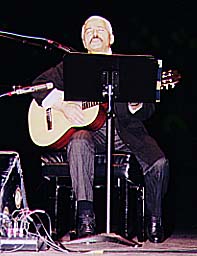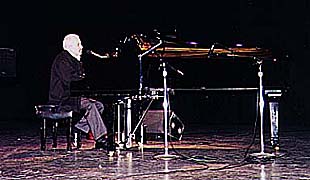

|
|
Welcome back Written and photographed by J. Javid A few weeks back I heard someone saying that Farhad was going to have a concert in San Francisco. Farhad? I thought. The same man who sang "Jom'eh"? *** When Farhad was as popular as Googoosh and Daryoush in the 70s, our house in Abadan was rocking with classical music (my father was especially fond of Wagner -- on maximum volume) and Western pop (my sisters were nuts about The Beatles). I myself listened to Top-40 hits on Radio Kuwait every night before I went to sleep. One day I was at the home of my best friend and classmate, Behyar Bakhshandeh. After lunch (his mother made the most delicious loobia - pinto beans - with lemon juice and Salad Shirazi), Behyar took me to the livingroom. He turned on the stero. "Have you heard this?" he said. It was Farhad's "Jome'h."
We had no clue, of course, what the song really meant. We were only 12 or 13 in our isolated oil company community in southern Iran. The year was around 1974. All we had on our minds were girls, going to the Golestan Club on Thursday nights, and watching the Friday Movie on TV -- "Oh God, I hope they'll show a film about pirates this week." We were also serious stamp collectors. Dead serious. "Ha, ha! Your Apollo rocket stamp is bent on the top corner!" *** I met with some family friends before I went to Farhad's concert last Saturday. "You're kidding? Farhad? You're skipping dinner with us to see him? The man can't even sing." I responded that I wanted to write an article. After all, as far as I know, this is Farhad's first concert tour since 1979. He lives in Iran and had a new album out a couple of years ago but he is not allowed to perform. Besides, I want his songs to take me to Abadan in 1974. But I didn't say that to my friends. *** The 1000-plus-seat hall in San Francisco's Palace of Fine Arts was almost full. There was a black piano, a stool, few microphones and a note stand on the stage. The show was supposed to start at eight. It was already a quarter to nine. The audience was anxious. A man finally appeared on the stage. People started clapping wildly before they could see his face under the spotlight. It was not him.
A short man slowly walked out of the right side of the stage. With his short, gray, hair and dark suit, he looked more like one of my old teachers rather than a pop star. He bowed, extended his arms with a broad smile, put his hands on his chest and bowed again, and again. But he didn't say a word. He sang about 15 songs -- mostly with the piano, and a couple with the guitar. He showed a passion and intensity that could only come straight from the heart. With every word, with every pounding of the note you could feel not only the pain from the sad songs, but also Farhad's. Were these the cries of a singer after almost 20 years of silence? Perhaps the song that he seemed to relate to most was, "Ayneh-ha" (Mirrors), where a man doesn't recognize himself in the mirror -- a man who can't bring back the past or tolerate the present. What got to me most was "Koodakaaneh" (Childhood Memories), about remembering Noruz as a child in the beginning of spring. But perhaps the most powerful moment was when he was repeating a line from one of his new songs: "I wish we could take our country with us wherever we want like violets."
The only word Farhad spoke to the audience throughout the night was "Moteshakeram" (thank you). There were interruptions between songs from people asking that he "say something." He would only respond with a smile. He said it all with his songs. We all knew it and appreciated it. Thank you, Farhad, and welcome back.

|
|
Web design by Bcubed
Internet server Global Publishing Group































 We played the song over and over again... "khanjar
az posht mizaneh, oon keh hamraaheh maneh... daareh az abr-e siaah khoon michekeh;
jom'eh-ha khoon jaay-e baaroon michekeh" (My companion stabs me in the back...
On Fridays blood rains from the black cloud ..."). Farhad sounded so cool and
morbidly serious.
We played the song over and over again... "khanjar
az posht mizaneh, oon keh hamraaheh maneh... daareh az abr-e siaah khoon michekeh;
jom'eh-ha khoon jaay-e baaroon michekeh" (My companion stabs me in the back...
On Fridays blood rains from the black cloud ..."). Farhad sounded so cool and
morbidly serious. "Ladies and gentlemen, my
apologies on behalf of the Iranian Cultural Foundation for this delay. Here's Farhad..."
And everyone stood up clapping. There were more than a few screams and lots of whistles.
"Ladies and gentlemen, my
apologies on behalf of the Iranian Cultural Foundation for this delay. Here's Farhad..."
And everyone stood up clapping. There were more than a few screams and lots of whistles.
